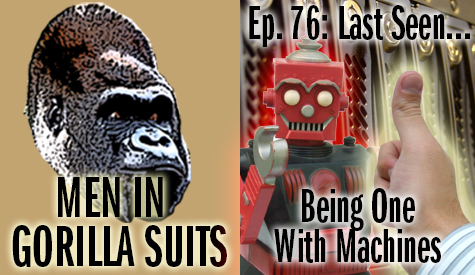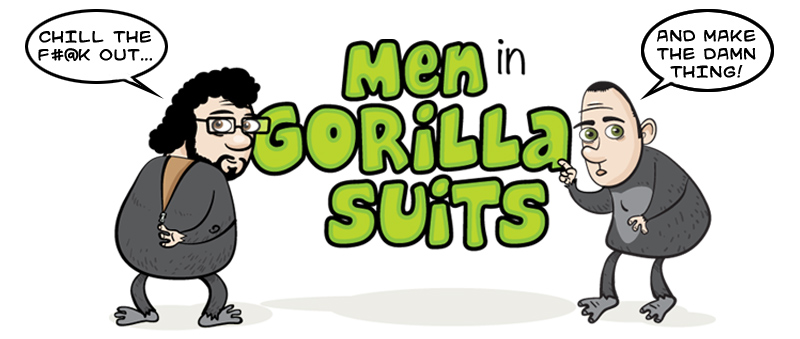 It’s easy to look at other times in history and think, “Man, I would have loved to have been alive back then to see all those new things come to be,” or “Things were so much simpler back then.” (Back in the times a papercut could mean a life-threatening infection.)
It’s easy to look at other times in history and think, “Man, I would have loved to have been alive back then to see all those new things come to be,” or “Things were so much simpler back then.” (Back in the times a papercut could mean a life-threatening infection.)
It’s often only after we’ve lived through a time that we can see it for what it was. The Gorillamen would argue that we live in the most interesting times…in part, because we’ve never seen a boom in technology like we have today. We are one with machines…and it will probably only become moreso in the future. That’s what we’re talking about this week.
We begin by stepping back 20 years, to 1994, and asking what our impression of high tech was back then. Then we step back to 1984 and ask what machines we interacted with at the time. Leap back to 1994 to discuss what machines we interacted with then.
Once we lay that down, we compare 1964 – 1984 in terms of technology, and then 1994 to today, to see which saw the most growth in new tech.
We’ve always interacted with technology, even if the “tech” was just a rock used to break something open. Today, though, the tech is far more advanced, and there’s no denying we’ve given a lot of our thinking over to computers. We talk a bit about how much time each day we spend interacting with a “smart” machine (computer, smartphone, tablet).
As we stated in the opening, we often don’t see what’s right in front of us as it’s happening. We devote a bit of time to where we think our interaction with machines will be in 20 years.
Recently, a computer was said to pass the Turing test. Whether a computer tricked people into believing it was the thoughts of a human or not, we’re nearing that point. We discuss what we think this means in the larger scale of human/machine interaction.
Ray Kurzweil predicts that machines will be able to feel the entire range of human emotions in 25 years; that the movie Her is almost prophetic. We discuss the implications of machines developing emotions and becoming fully conscious…and it goes well beyond your system saying, “No, Dave — I will not download that video for you. I’ve heard that can make you go blind!”
Another popular prediction is that there will come a day when it’s possible to download your thoughts, emotions, and memories into a machine and live on in some state. We ask each other if we’d do that, and then: why or why not?
We wrap the episode up with two questions:
- What’s the next step you’d hate to see in human/machine interaction?
- What’s the future of human/machine interaction you want to see?
So jump on your machine and let us know what you think about all this in the comments below…
Podcast: Play in new window | Download

What I don’t want to see happen: sentient machine slavery. But I believe there’s little chance of that happening anyway, at least not long-term.
What I do want to see happen: 3D printing and replicator technology perfected, the collapse of capitalism of every other scarcity-based economic system, and a post-scarcity existence!
Here’s my question: Given the scenario that today’s simulated or virtual reality is either indistinguishable or preferable, and safer than non-simulated reality (ignoring the “we’re living in a simulated reality already” argument), and IdentiClone technology is perfected, would you choose to make a VR clone of yourself and live in a simulated or virtual reality as a clone? (Your original would continue in your original life.) Why?
I will gladly transcend my humanity when the time comes. 🙂
With sentient machines, I was always like, “But…then they wouldn’t be robots…” Shawn’s point that robots need to, on some level, always be a tool (other wise, we’re talking slavery), is a good point. Sci-Fi [usually] teaches us to love the concept of totally sentient machines. But the reality is, if we build them to do tasks, sentience would be terrible.
I would also love 3D/Replicator technology to allow us to become self sufficient. I can still see some coming up with…some kind of currency to view certain content and things we can’t make, but I know I’d be like, “Everything I create for free!” (I’m pretty much there already.) It would weird to see how it plays out. I know a lot of friends are like, “Capitalism crumbles and we all do what we want!” but…it doesn’t account for things like travel. I can’t make a plane and zip off to New Zealand and stay on certain properties without some kind of exchange. But…I could definitely just live a life without a day job and have enough to make me happy. Still, though…if I want a plot of land, on some level, an exchange of some sort would still occur. So I don’t see technology bringing capitalism down. But it would definitely be a different world for people like me who just want enough and the ability to make the things I love making.
The completely virtual world thing is fascinating to me. I LOVE the thought of being in something like a holodeck, but being there as an avatar so I could fly, breathe underwater, and things like that. At the same time, there will always be something, I think, that pulls us to analog existences. I’d be fine having a clone of myself running free and having fun in a virtual world. But even if it came down to us being jacked in to a virtual world (essentially in a life-sustaining chamber, physically, while a virtual me runs free, controlled by my mind), I still think humans will have a pull to analog. Just to say, “This is REAL real, even if it’s a simulation of breaking free from a virtual world, but still in the virtual world.)
But yep, I’d allow a VR Christopher Clone his fun in a virtual world.
A VR Christopher clone . . what if the way these clones were made was a “splitting” of the “mind” (for brevity’s sake) into 2 (or more) identical mind substrates, and the original substrate was destroyed in the process? Where would your perception originate? Who and where would “you” be? Those are questions I frequently ponder . .
Well, “you” wouldn’t be “you,” in either case. The experiences your identical clone would have would eventually diverge from your own and make him a different person in the first case; in the second, the “original” you would be gone, replaced by a new version — even if scientifically identical, it’s still not the original. Not that, in either case, the clone would be any *less* a person than you are… but it wouldn’t be the same person.
You know, like William Riker and Tom Riker.
If “you” wouldn’t be “you,” who gets to claim any original spouse, children, job, home, etc?
I’d hope the spouse could choose that. But it would probably be the government. Thanks, *Obama.*